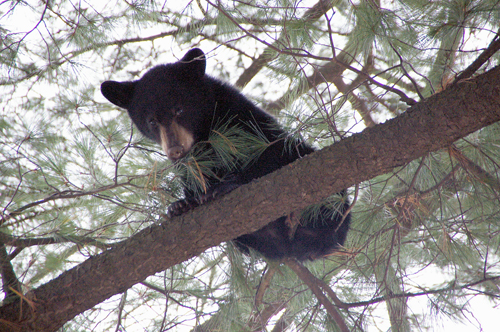‘A fed bear is a dead bear’

A black bear cub sits on the limb of a white pine tree. News file photo
For many people in this nation, the only way to see a real, live bear is to visit the zoo. For people in the Adirondacks, though, bears can turn up in our backyards, on a stroll in the woods or at a campsite. Many times, they’re just looking for food.
State Department of Environmental Conservation Commissioner Basil Seggos recently reminded New Yorkers to remove or secure outdoor food sources that may attract black bears.
We’ve seen many human-bear interactions in the Adirondacks over the years, some that have not ended well for the bear. Remember the common saying: “A fed bear is a dead bear.”
In 2012, for example, the DEC shot and killed a 90-pound yearling black bear in downtown Long Lake. It was getting too close to humans because residents were feeding it. One woman fed the bear a mixture of milk and maple syrup after it began visiting her property in the spring. Then she began preparing nightly meals for it, such as macaroni and potatoes, and the bear sometimes slept underneath her porch.
A DEC spokesperson said the bear was killed because it had lost its fear of humans and was actively approaching humans seeking food, becoming a public safety hazard.
In the summer of 2020, the DEC temporarily closed campsites and lean-tos in the Lake Colden area of the High Peaks Wilderness — due to an aggressive bear looking for food. The bear was caught and euthanized.
We hope these incidents serve as a reminder for people in the area to be safe and take sensible precautions — at home and in the woods.
In the summer, black bears search extensively for easily obtainable, calorie-dense foods. They will readily use human-created food sources, and repeat access can make bears bolder, leading to an increase in human-bear conflicts, especially when natural food sources are scarce.
Feeding bears intentionally is illegal, and unintentional feeding can create problems for the surrounding community, or even the bear if it becomes a threat to people or property.
–
Home
–
– Empty and clean up spilt seed from feeders, and let nature feed the birds from spring through fall.
– Secure garbage cans in a sturdy building, clean or remove all residual grease and food from grills, and store pet and livestock food indoors.
– Consider installing electric fences around chicken coops or apiaries to protect flocks and hives.
–
Camping
–
1. Keep campsites and lean-tos as clean as possible.
2. Clean up after all meals immediately. Keep grills, pots, pans, cooking utensils, and wash basins clean when not in use.
3 Leave coolers and food inside car trunks or truck cabs.
4. Store food and coolers in food lockers when available.
5. Never keep food, coolers, or scented items in tents when camping. Store toiletries securely with coolers and food.
6. Do not put grease, garbage, plastic diapers, cans, bottles, or other refuse in the fireplace.
7. Dispose of garbage in the campground’s dumpsters every evening.
Visitors to the backcountry are encouraged to:
1. Pack a minimal amount of food. Use lightweight and dehydrated foods. Plan all meals to avoid leftovers.
2. Use bear-resistant food canisters, which are required in the Eastern High Peaks Wilderness of the Adirondack Park by overnight users between April 1 and Nov. 30.
3. Cook and eat before dark and cook away from campsites.
4. Avoid spills and drippings while cooking and do not pour grease into fire pits.
5. Never leave food unattended.
–
More information
–
Bears were living in the Adirondacks before humans were and are a wonderful part of nature here, but nature can be dangerous. Learn more about bear safety on the DEC’s website: www.dec.ny.gov/animals/6995.html or visit bearwise.org.
–
If you encounter a bear
–
1. Don’t panic. Most bears are as afraid of people as people are of bears.
2. Never approach, surround, or corner a bear.
3. Back away slowly. Do not run.
4. Do not throw backpacks or food at bears. If bears are rewarded with food, they will continue to seek food from people.
5. If feeling threatened by a bear, raise your arms over your head to look bigger and yell loudly at the bear while slowly backing away.

